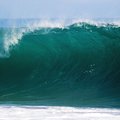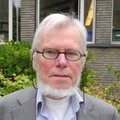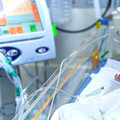Archive
18 February 2021
Windsurfing virus particles can bridge 1.5 metres

Can a light breeze nullify the 1.5-metre measure indoors? It looks like it could, says Saša Kenjereš (Chemical Engineering) in a new article in Annals of Biomedical Engineering. He modeled the way virus particles leave a talking person's mouth, as well as how far particles can travel in both quiescent and moving air. In doing so, he found that a virus can surf along on a slight tailwind and thus travel much farther than in an environment in which the air is completely still. In a room with stationary air, 1.5 metres seems to be a safe distance. But a barely perceptible breeze allows virus particles to bridge such a gap with relative ease.
03 February 2021
CO₂ removal from the atmosphere using sustainable energy

Er wordt hard gewerkt aan methodes om CO₂ af te vangen uit de atmosfeer, om op die manier klimaatverandering tegen te gaan. Naast bestaande methodes met giftige oplosmiddelen, zijn er nu elektrochemische technieken in opkomst die kunnen werken met duurzame elektriciteit. De Delftse onderzoeksgroep van David Vermaas analyseerde samen met Wetsus en Caltech deze verschillende duurzame methodes om CO₂ af te vangen en vergeleek ze voor het eerst met elkaar. Daarnaast beschreven de onderzoekers ook welke methodes de meeste potentie hebben om grootschalige CO₂-afvang mogelijk te maken. Hun paper verscheen onlangs in het wetenschappelijke tijdschrift Energy & Environmental Science.
28 January 2021
New Art-Embedded Specialisation in BSc Honours Program also available for PhD’s

In cooperation with colleague philosophers from TBM and professional artists, Eduardo Mendes formulated a new Specialisation in the Interfaculty BSc Honours Program named “Awareness & Culture”.
28 January 2021
Carrier multiplication for more efficient solar energy conversion

Single-junction silicon solar cells can have a maximum of ~33% efficiency known as the Shockley-Queisser limit. How to overcome this efficiency barrier is an important research question that is addressed by postdoc Sourav Maiti from the Optoelectronic Materials Section.
20 January 2021
Paulien Herder appointed Dean Faculty of Applied Sciences (AS)

12 January 2021
Atsushi Urakawa wins the prestigious “Japan Academy Medal” after previously receiving the JSPS award

The prize is awarded for the development of various CO2 catalytic conversion technologies and the methodologies to study catalytic reactions while catalysts are functional.
04 January 2021
Greener chemistry through new approach to catalysis

Researchers in Delft have developed at catalyst that is even effective in negligible amounts. The form and durability of the catalyst mean that it lasts much longer in reactions, saving a great deal of energy, waste and costs. The results were published in Nature Communications.
04 December 2020
In Memoriam: Prof.dr.ir. Herman van Bekkum (1932 – 2020)

01 December 2020
Delft researchers develop blood oxygenation sensor for premature babies

Doctors have to keep a close eye on babies that are born prematurely, and brain oxygenation is perhaps the most important thing to monitor. Up to 50 percent of premature babies suffer brain damage, leading to neurological problems. Researchers at Delft University of Technology have now developed a wireless sensor that monitors the health of the baby's brain in a simple, inexpensive and comfortable way for the child.
30 November 2020
First prize from De Nederlandse Gasindustrie Prijzen 2020 for Joseph Daatselaar

On November 30, Joseph Daatselaar received the first prize from the Dutch Gas Industry Awards (De Nederlandse Gasindustrieprijzen) for his thesis research “Microporous Separators for CO2 Electrolysis”.